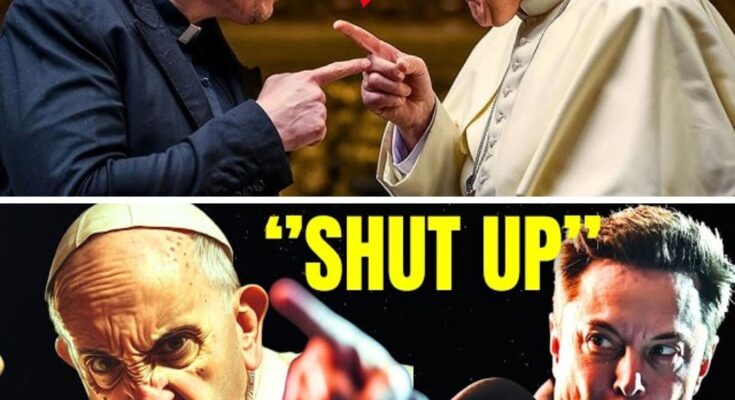The world watched, breathless. The Vatican’s ornate Sistine Chapel, normally a sanctuary of hushed reverence, was now a global stage.
Not for a religious ceremony, but for a debate that had been brewing for months, a clash of titans, a confrontation of ideologies. On one side, Pope Francis, the spiritual shepherd of over a billion Catholics, a man of simple grace and profound empathy.
On the other, Elon Musk, the visionary entrepreneur, a champion of technological innovation and the relentless pursuit of progress. Their debate, broadcast live to every corner of the globe, had become more than just a discussion – it was a symbol of the existential questions facing humanity.
It had started innocently enough, with a seemingly benign tweet from Musk. He had lauded the potential of artificial intelligence to eradicate suffering and solve global crises, a technological Messiah to usher in a new era of human flourishing.
Pope Francis, while acknowledging the potential of technological advancement, had expressed concerns about its unchecked power and the ethical implications of placing faith solely in technology, cautioning that it could erode our humanity.

Their exchanges had escalated, becoming increasingly pointed, fueled by online commentary and global media attention.
Finally, against all odds, the two agreed to meet in a public forum, a historic debate that would pit faith against progress, tradition against innovation, spirituality against science.
The atmosphere in the Sistine Chapel was electric. The air crackled with anticipation as the two figures took their places at the center of the room, a stark contrast against the backdrop of Michelangelo’s masterpiece.
Pope Francis, dressed in his simple white cassock, exuded an aura of calm and serenity. Musk, in his characteristic dark suit, seemed like a coiled spring, his energy palpable.
The moderator, a renowned journalist known for her impartiality, opened the floor.
“Pope Francis,” she began, “You have repeatedly cautioned against placing too much faith in technology. Can you elaborate on your concerns?”
Pope Francis nodded slowly, his gaze fixed on the assembled audience, on the billions watching around the world. “My concern is not with progress itself, but with the direction of that progress.

When we see technology as the ultimate answer, when we prioritize efficiency and innovation above all else, we risk sacrificing our very humanity. We become instruments of our own creations, losing sight of the inherent dignity and sacredness of every human life.”
He spoke of the dangers of AI becoming autonomous, of the potential for algorithms to perpetuate biases and inequalities, of a future where the human spirit is diminished in favor of efficiency and control.
“We must not lose sight of our spiritual and moral compass, our responsibility to care for one another, especially the most vulnerable. Technology should serve humanity, not the other way around.”
Elon Musk leaned forward, his eyes narrowed, the intensity in his gaze almost unsettling. “Your Holiness,” he began, his voice sharp and clear, “with all due respect, you are clinging to outdated paradigms.
Technology isn’t a threat, it’s the solution. We face existential threats – climate change, disease, overpopulation – that can only be solved with radical innovation.
We need to embrace AI, genetic engineering, space exploration to secure our future. To shackle ourselves with outdated fears and ethical concerns is to doom ourselves.”
He spoke passionately about his vision for a multi-planetary future, his unwavering belief in the power of human ingenuity to overcome any challenge.
He argued that faith, while a source of comfort, lacked the tangible solutions that science and technology offered. “We cannot pray away climate change or cancer; we need to solve them through innovation.”

The debate went on for hours, a compelling back-and-forth that kept the audience, both in the chapel and around the globe, spellbound. Pope Francis spoke of the importance of community, of compassion, of the interconnectedness of all life.
Musk spoke of the potential for technological breakthroughs, of the need to push the boundaries of human knowledge, of a future where limitations were merely challenges waiting to be conquered.
The arguments were powerful, the clash of perspectives undeniable. There were moments of heated exchange, but also of respect and understanding, a genuine attempt to bridge the divide that separated their worldviews.



